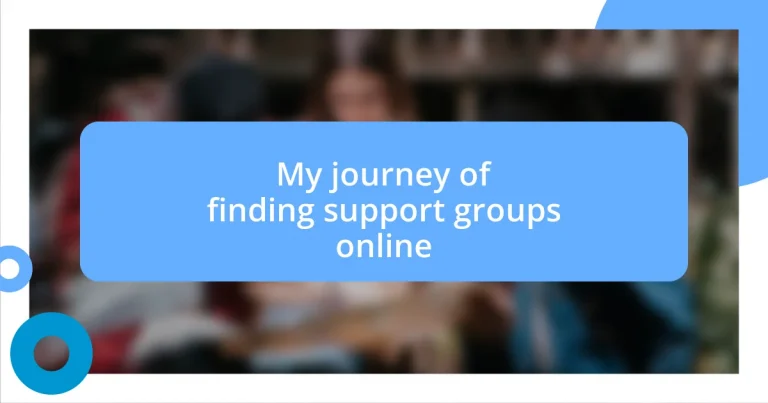Key takeaways:
- Recognizing the importance of support and connection is crucial for emotional health, especially during challenging times.
- Finding the right support group involves evaluating group dynamics, size, and moderation to ensure a positive and safe environment for sharing experiences.
- Active engagement and sharing within the group enhance connections, foster responsibility, and create a supportive atmosphere that can significantly impact personal growth.
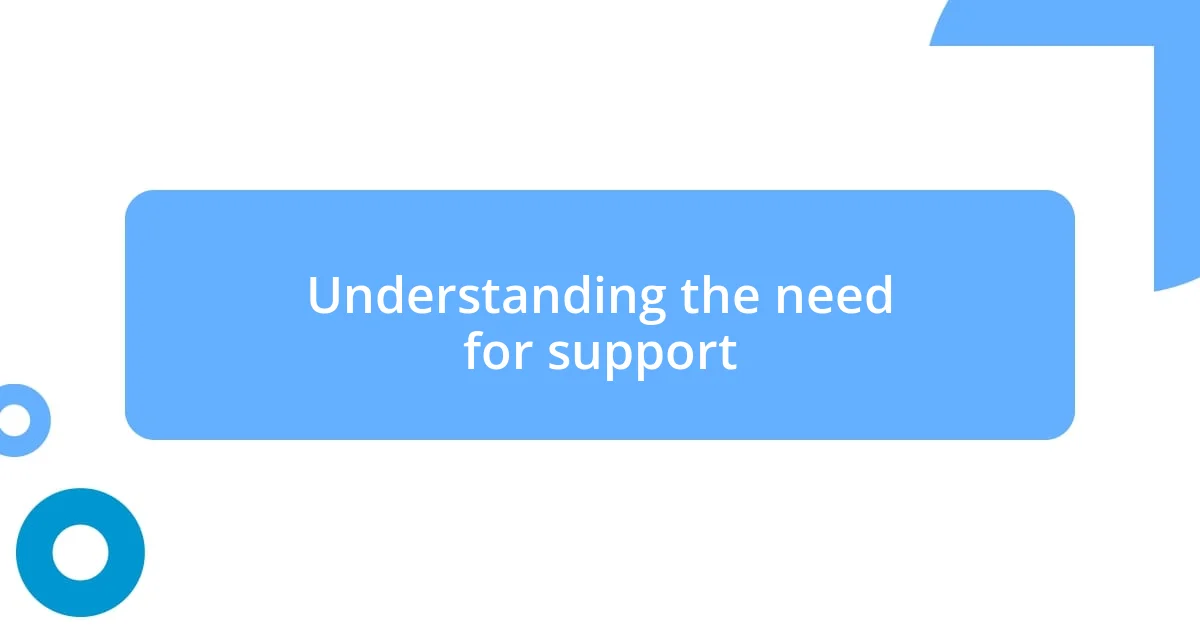
Understanding the need for support
Support is a vital part of our emotional health. I still remember a time when I felt completely alone during a tough phase in my life. I often wondered, “Why does it feel like no one understands?” It was in those moments that I realized how deeply we crave connection and empathy from others who truly get what we’re going through.
When we face challenges, whether it’s a mental health issue or a life transition, the need for support can feel overwhelming. I found solace in connecting with like-minded individuals who shared their experiences openly. Hearing their stories made me think, “If they can find strength, maybe I can too.” That sense of community can be incredibly powerful and affirming.
Sometimes, we might hold back from seeking support due to fear or stigma. I’ve been there, afraid to reach out because I thought I had to handle things on my own. Yet, the truth is, everyone needs support at some stage in their journey. Acknowledging this need can be a courageous step towards healing and growth.
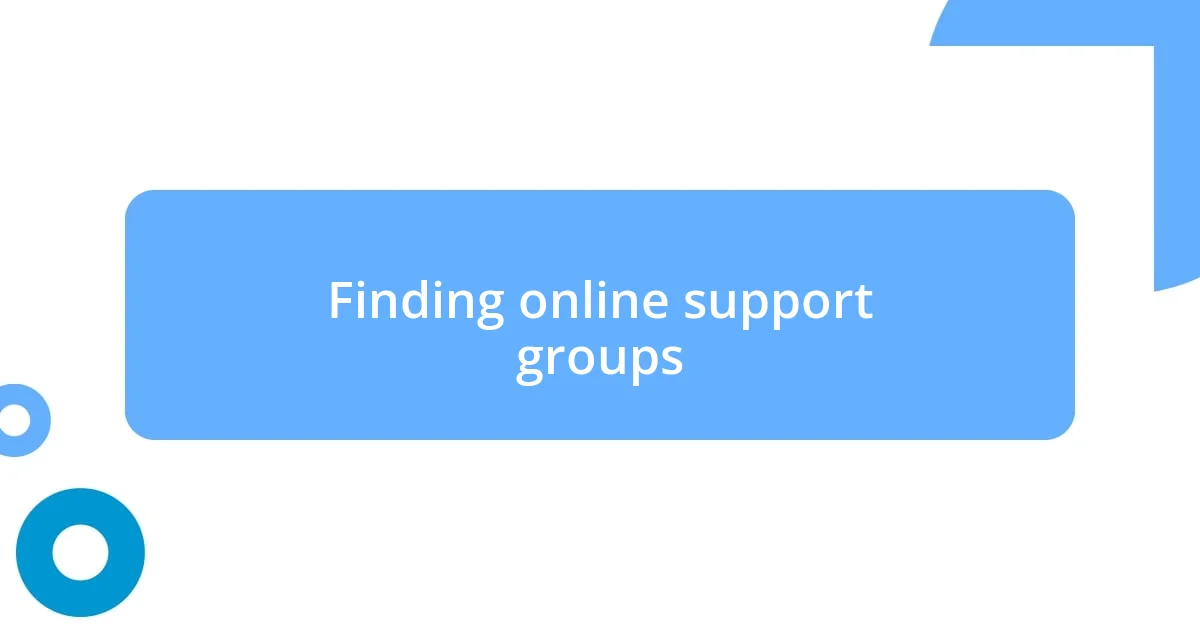
Finding online support groups
Finding online support groups can feel like a daunting task at first. I remember scrolling through endless forums and social media pages, hoping to find a safe space that resonated with my feelings. It’s not just about typing “support group” into a search bar; it’s about finding a community where I felt truly seen and understood.
Here are some effective strategies I found useful in my search:
- Social Media: Platforms like Facebook and Reddit have numerous support groups tailored to specific issues, making it easy to connect with others.
- Mental Health Websites: Resources like NAMI (National Alliance on Mental Illness) often curate lists of online support groups where individuals can share their stories and experiences.
- Online Therapy Services: Many of these services include community forums as part of their offerings, often moderated by professionals for a safe environment.
When I finally found my group, it was like a weight lifted off my shoulders. I still cherish the warmth and understanding that greeted me, reminding me that no one has to navigate life’s challenges alone.
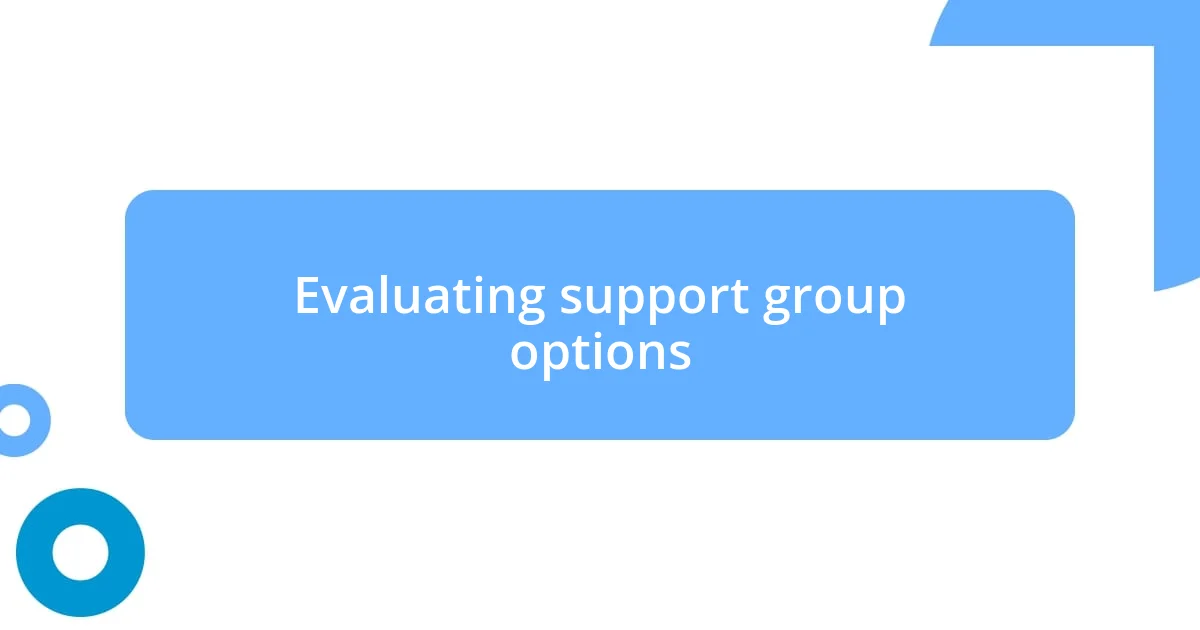
Evaluating support group options
Evaluating the right support group options is crucial for ensuring a positive experience. I’ve certainly had my share of trial and error in this process. For me, it became essential to assess the group’s dynamics and the values they uphold. I remember joining one group where the environment felt competitive rather than supportive, which was disheartening. In contrast, finding a group that emphasizes empathy and shared experiences made me feel safe to express my feelings without judgment.
When considering options, I often look at the size of the group and the level of engagement. Smaller groups can be more intimate, allowing for deeper connections. I joined a larger group once, and while it provided a wide range of perspectives, it sometimes felt overwhelming. It’s about knowing what resonates with you—do you prefer a close-knit circle or a larger community to draw insights from?
Lastly, don’t overlook the importance of moderation and guidelines within the group. I’ve found that groups with clear boundaries and respectful practices tend to foster healthier interactions. This became evident to me when I saw how a well-moderated group could navigate difficult discussions while maintaining a supportive atmosphere. Being part of a space that prioritizes safety helped me open up more than I ever thought I could.
| Criteria | Considerations |
|---|---|
| Group Size | Small groups foster intimacy; large groups provide diverse perspectives. |
| Moderation | Groups with clear rules promote safety and healthy discussions. |
| Engagement Level | Active participation enhances support experiences. |
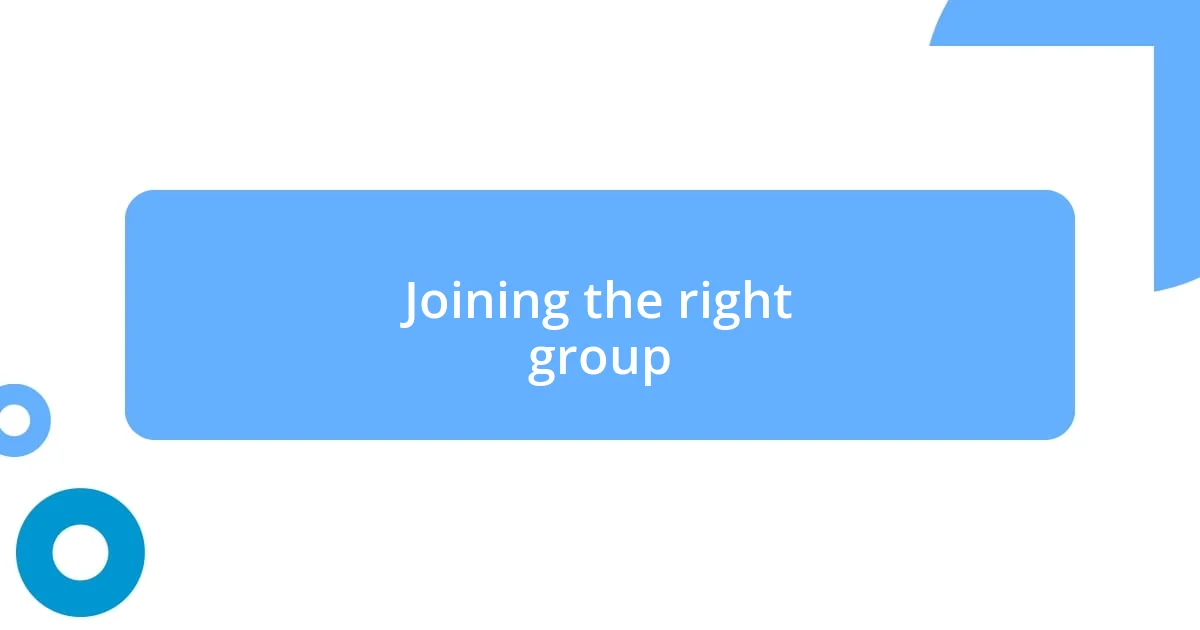
Joining the right group
Finding the right support group can sometimes feel like searching for a needle in a haystack. I remember spending hours clicking on links, only to find groups that didn’t quite resonate with my experiences. It’s like dating—sometimes, you just know when it’s a match. Trusting your instincts about a group’s atmosphere can save you a lot of time and emotional energy.
One particular group stood out to me not just because of their support structure but due to the warmth radiating from their posts. I still recall one member sharing their heart-wrenching story, instantly sparking a flood of empathy and understanding in the comments. It hit me that this was the kind of interaction I craved. Have you ever joined a space where you felt like you could be completely yourself? That feeling is invaluable and should be a priority when choosing a group.
It’s essential to pay attention to how well the group defines its purpose and guidelines. I’ve encountered diverse groups with different focuses, and discovering one that emphasizes mutual respect changed everything for me. I learned to ask questions: Does the group encourage sharing successes as much as challenges? This reciprocal approach creates a supportive cycle. What was your experience with group dynamics? Remember, finding that right fit can transform not just how you cope but how you thrive.
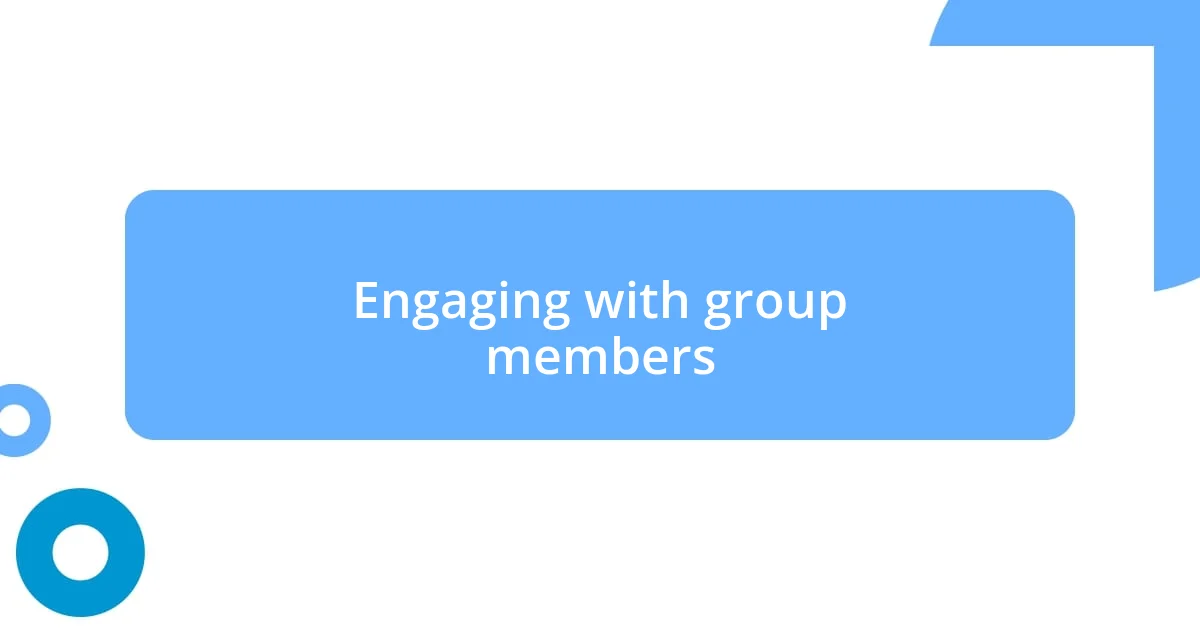
Engaging with group members
Engaging with group members is where the real magic happens. One of my favorite experiences was during a virtual meet-up when a member opened up about their struggles with anxiety. As they spoke, I felt this immediate connection, like we were all nodding along in silent understanding. Have you ever been in a place where someone’s vulnerability has just brought everyone closer? It’s a reminder that shared experiences can ignite powerful bonds.
I’ve also found that asking questions can really enhance interactions. In one group, I started a conversation about coping strategies, and surprisingly, it led to a rich discussion with everyone chiming in, offering insights and personal anecdotes. The engagement was electric! It reminded me of how empowering it can be to share your thoughts and see that they resonate with others. Have you tried leaning into your curiosity with group members? It could unlock connections you never expected.
Moreover, participating actively in discussions not only helped me grow but also fostered a sense of responsibility towards others. I recall a time when I offered support to a member going through a tough patch. When I saw them return to share their progress, I felt a sense of pride, knowing that my words had made a difference. That kind of involvement can transform a casual interaction into a profound relationship. Isn’t it amazing how engaging with others can create such rewarding experiences?
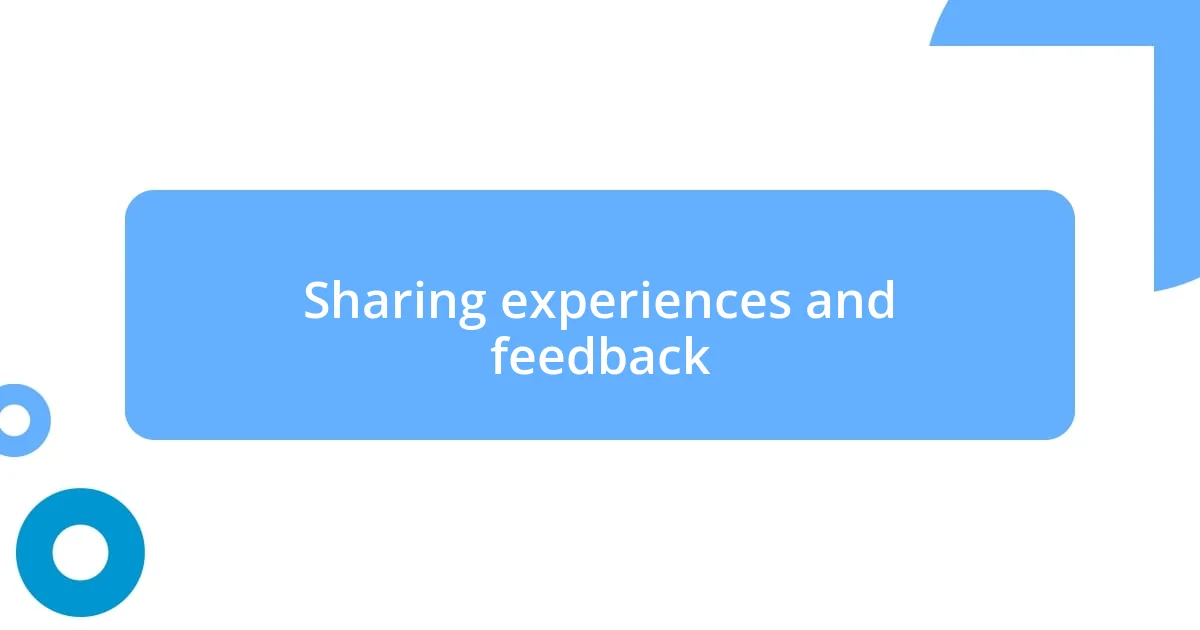
Sharing experiences and feedback
Sharing experiences in a support group can be a cathartic release. I remember the first time I shared my own struggles during a group chat; my voice trembled, but the response was overwhelmingly positive. It was like lifting a weight off my chest, hearing others say, “I get that.” Have you ever felt that moment when vulnerability turns into connection? It’s an incredible feeling that encourages others to open up, creating a safe haven for all.
Feedback is equally crucial in these settings. I distinctly recall a group member thanking me for a piece of advice I shared about managing stress. It was a small comment, but it highlighted how every interaction matters. When we give and receive feedback, we validate each other’s feelings and experiences. Isn’t it amazing how a few encouraging words can make a world of difference?
In one memorable session, we set aside time to reflect on what worked well within the group. I remember suggesting we incorporate a weekly check-in to see how everyone was feeling. The enthusiasm that sparked from that idea reminded me of the importance of collective improvement. Does your group have mechanisms for sharing feedback? Such dialogues can elevate the group’s atmosphere, transforming it from merely functional to genuinely supportive.
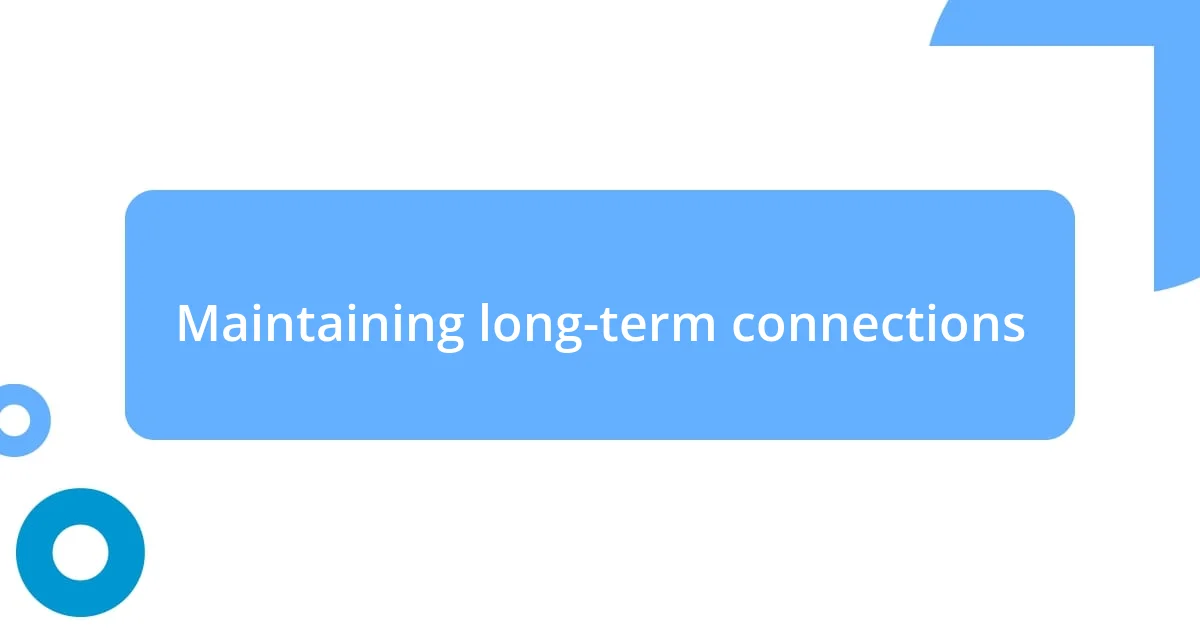
Maintaining long-term connections
Maintaining long-term connections in online support groups demands a bit of intentionality. I remember attending a group session where we set a recurring date for our meetings. When the reminders popped up on my calendar, I felt a mix of excitement and anticipation. Have you ever found that consistent scheduling helps solidify relationships? It’s a small act that turns a casual acquaintance into someone you genuinely look forward to connecting with.
I often make it a point to reach out individually to members outside of our scheduled meetings. Just last week, I messaged a friend from the group who had mentioned feeling overwhelmed with life’s challenges. The simple gesture of checking in made our bond stronger. There’s something about letting someone know they’re on your mind that fosters warmth and trust, don’t you think?
Lastly, sharing personal milestones helps to deepen those connections over time. A while back, I celebrated my first anniversary of sobriety, and sharing that moment with my support group felt surreal. Their congratulatory messages and shared joy made my achievement feel even more significant. Isn’t it wonderful how celebrating each other’s victories can strengthen the fabric of a community?












